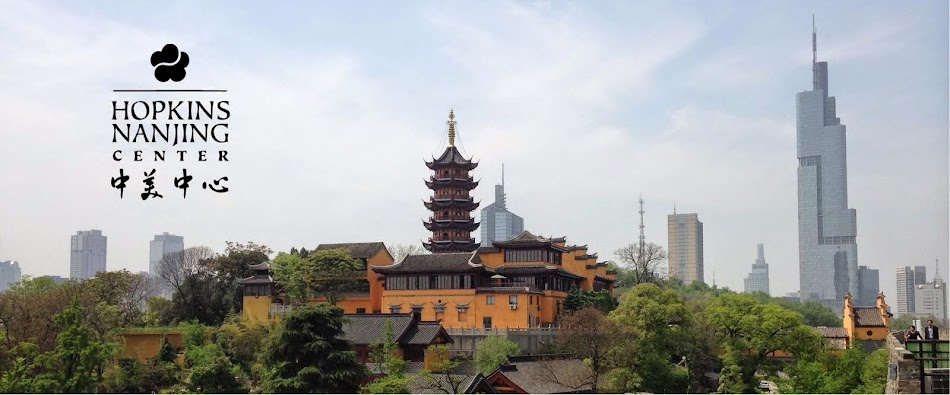 |
| SAIS and HNC students visit Wells Fargo in Shanghai. |
During the week-long Asia Career Trek, we had the opportunity to visit a variety of companies and firms ranging from finance, risk management, and healthcare in Shanghai and Hong Kong including, Johnson & Johnson, HSBC, and Morgan Stanley. We were kindly received by many of the employees at these companies, most of whom were SAIS or HNC alumni. The alumni were at all different points in their career, and the stories they shared about their work was illustrative and helpful to understand the businesses we visited.
In our meetings with various practitioners, we learned a great deal about professionalism in the workplace. First, always be prepared. Basic qualities associated with preparedness include punctuality, professional attire, a clear mind, necessary knowledge, and understanding of the topic. The importance of these attributes was reiterated to us in our meetings in Hong Kong. During our visit to Control Risks, a member of their senior leadership began the meeting by asking us specific questions about the company, such as the name of the CEO, the location of the company’s headquarters, and the name of the company’s online platform. During our meeting at Natixis, SAIS Alumna Ms. Trinh Nguyen, a Vice President and Senior Economist at Natixis Hong Kong office, impressed on us that the key to a successful presentation was preparedness – practicing repeatedly until you are 100% familiar with your script. “Always go back to the beginning,” she said, “even if you get stuck with your name.”
 |
| HNC Alumnus Kelly Morris and SAIS Alumna Nora Wasserman host students at Morgan Stanley in Hong Kong |
Before you start looking for a job, it is important to first know your interests and skills. Build up a skillset that would make you invaluable to an employer. What skills would make you succeed in the finance and banking sector? Some suggestions provided were having good skills in quantitative analysis, basic accounting, statistics, and corporate finance. Besides finding out where your interests lie, it is also important to research and be familiar with what kind of services are in high demand these days. Take the extra time you have outside of your studies to find this out.
Second, apart from “hard skills” such as statistical or analytical capabilities, professionals in the financial sector also value “soft skills,” including effective communication skills, empathy with your clients, skills to sell yourself and the products or services you provide, and networking skills. One of the interpersonal skills that appeared most frequently in presenters’ speeches was networking. Can you make cold calls to clients, HR, or alumni? Can you tell a concise but impressive story? Can you sell yourself to these potential employers and build up a good relationship with them? Networking is linked to the first point of preparedness as well. Researchers from JP Morgan emphasized that it is essential to do the groundwork such as extra reading of the team’s work in order to ask smart questions and engage in a productive conversation with your boss.
Networking is important even before finding a job. Be proactive and resourceful. There are numerous SAIS and HNC alumni who are already working in these industries who would be willing to lend you a helping hand. You can ask to meet with them for coffee and see if the job you want to apply for is the right fit for you. They can point you in the right direction or help to forward your resume at a critical time in the hiring process.
Last but not least, strategic thinking and the ability to look at a bigger picture. As Han Lin, Deputy General Manager of Wells Fargo Shanghai, put it in his presentation, your story will become increasingly convincing as you acquire technical, managerial and political skills successively. Here, political skills refer to strategic thinking. Most jobs introduced on the Asia trek require a global view and mastery of regional studies. This is where SAIS and HNC students’ competitive advantage lies. Many of the presenters said that, compared to other students who have just studied an MBA or finance, SAIS and HNC students have a better macroeconomic perspective on what is happening in the global economy because our education is interdisciplinary. Many presenters also suggested that students should make full use of their schools’ resources to build up capabilities required to work in the financial sector in the future.
Written by Teng Man '18 and Kris Rodulfo, MAIS ‘18











